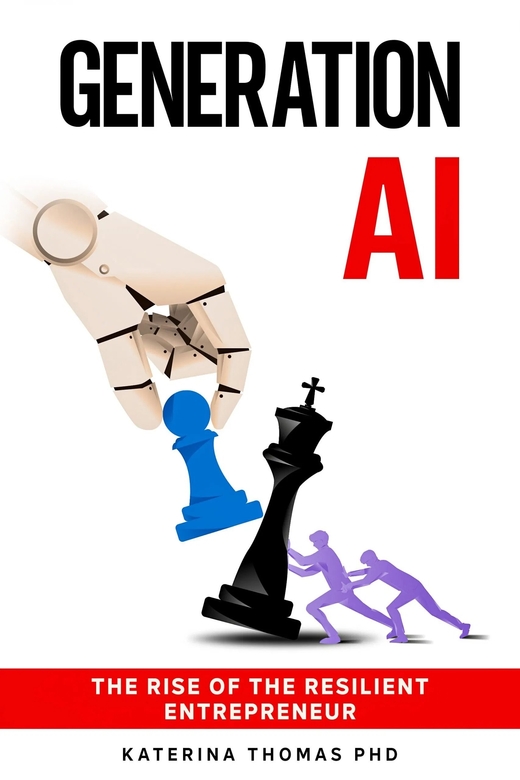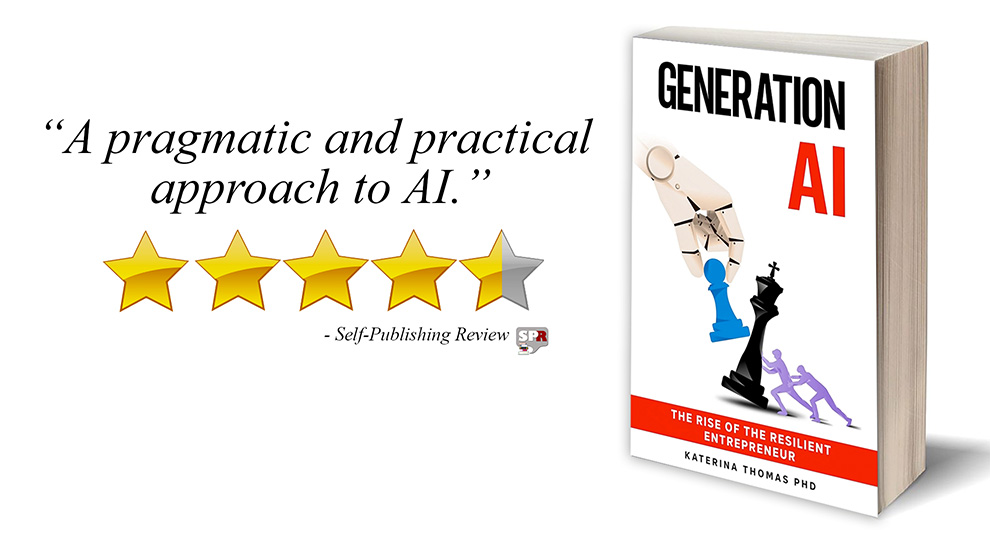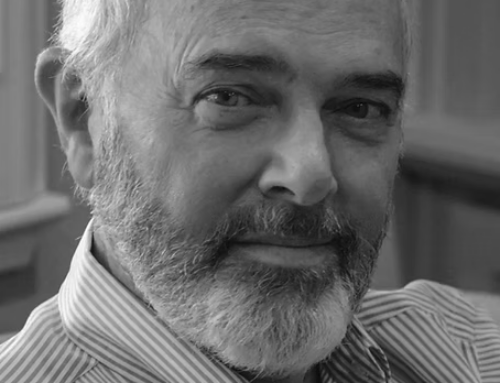 Katerina Thomas is a pioneer in educational innovation, with over two decades of experience in teaching technology and entrepreneurship. Katerina’s unique approach has captivated classrooms and driven remarkable results in fostering creativity, critical thinking, and entrepreneurial skills. Certified in a powerful LEGO® based methodology, Katerina has a proven track record of turning playful learning into serious educational outcomes.
Katerina Thomas is a pioneer in educational innovation, with over two decades of experience in teaching technology and entrepreneurship. Katerina’s unique approach has captivated classrooms and driven remarkable results in fostering creativity, critical thinking, and entrepreneurial skills. Certified in a powerful LEGO® based methodology, Katerina has a proven track record of turning playful learning into serious educational outcomes.
Her research delves into digital transformation, innovation, and resilience, aiming to unravel the intricate theories underpinning these fields. Central to her research is how creativity, adaptability, and resilience interact within our fast-changing digital environment. This entails evaluating foundational and modern theories of digital transformation and innovation in practical contexts, alongside monitoring the latest technological and industry developments to ensure her research remains relevant in the contemporary digital landscape.
Tell us about your book.
My book Generation AI: The Rise of The Resilient Entrepreneur explores how artificial intelligence is reshaping the job market and economy, and how individuals can develop the skills and resilience needed to thrive in this new landscape. The book examines the potential impacts of AI on various industries and jobs, discussing both the opportunities and challenges presented by increasing automation and AI adoption. It argues that creativity, resilience, and entrepreneurial thinking will be crucial skills for succeeding in an AI-driven future.
In my book, I draw on my background as an academic researcher, educator, and entrepreneur to provide insights on navigating technological change. Key topics covered include: The current state and future potential of AI technology, how AI is transforming different sectors like manufacturing, retail, healthcare etc., the skills and mindsets needed to remain relevant as AI advances, the importance of creativity and “big picture” thinking; Building resilience and mental wellbeing to thrive in uncertain times; and Opportunities for innovation and entrepreneurship in the AI era. The book aims to help readers understand the far-reaching consequences of AI disruption and provide strategies for adapting and thriving in this new technological landscape. It’s written for a general audience, not just technical experts, to help ordinary people prepare for potential disruptions to jobs and the economy.
Why did you want to write a book?
My rationale for writing the book was to provide a concise but comprehensive research-based outline of the challenges that we face. It is my hope that this book will help you understand the far-reaching consequences of AI disruption on your life and the lives of your children. I wanted to provide a balanced account of what AI means for individuals and families, and what they can do about it, and to offer insights for ordinary people on how to prepare for potential unemployment due to automation. To address questions raised by educators about the importance of creativity, problem-solving, and soft skills in the age of AI, and to equip readers with knowledge to help them stay relevant and have meaningful lives as AI advances.
Why did you choose to self-publish?
I wanted to maintain full control over my writing and ideas without having them shaped or altered by a publisher’s perspective. Self-publishing allowed me to present my unique insights on AI and its impact on society exactly as I envisioned them. Self-publishing allowed me to bypass the often lengthy traditional publishing process and bring these ideas to readers more rapidly. As someone writing about entrepreneurship, I felt it was fitting to take an entrepreneurial approach to publishing my own work. The process of self-publishing itself has been an invaluable learning experience, giving me first-hand insight into the publishing industry that I can share with my readers and students.
 What tools or companies did you use, and what experience did you have?
What tools or companies did you use, and what experience did you have?
I primarily used Scrivener to plan and write “Generation AI: The Rise of The Resilient Entrepreneur”. In addition to Scrivener, I used Grammarly – for initial proofreading and editing, and Affinity Publisher for formatting the book interior. I outsourced book cover design to Fiverr. For the actual publishing process, I used Amazon’s Kindle Direct Publishing (KDP) platform to release both the e-book and paperback versions. KDP’s user-friendly interface made the upload and publication process relatively straightforward.
Would you self-publish again?
Yes, I would definitely consider self-publishing again for future books. The experience of self-publishing “Generation AI: The Rise of The Resilient Entrepreneur” has been incredibly rewarding and educational. That said, self-publishing does come with its challenges, particularly in areas like distribution and marketing. However, the benefits of creative control, speed, and flexibility outweigh these challenges for me. As the publishing industry continues to evolve alongside technology, I believe self-publishing will become an increasingly attractive option for authors, especially those writing about cutting-edge topics like AI and its societal impacts.
What do you think are the main pitfalls for indie writers?
Traditional publishers have established marketing channels. Indie authors often struggle with effectively promoting their books and reaching their target audience. It can be difficult for indie authors to determine the right price point for their books, balancing the need for sales with fair compensation for their work. Indie authors often have to juggle writing, editing, marketing, and business management, which can be overwhelming and impact the quality of their work. Traditional publishing offers networking opportunities that indie authors may miss out on, potentially limiting their growth and opportunities. With the ease of self-publishing, the market is flooded with books, making it harder for individual authors to stand out. Also, despite improvements, there can still be a stigma attached to self-published books, with some readers and industry professionals viewing them as lower quality. Indie authors need to learn many aspects of the publishing business, which can be time-consuming and challenging.
What tips can you give other authors looking to self-publish?
Do your research and plan carefully. Self-publishing requires wearing many hats beyond just writing. Take the time to understand the entire process before diving in. Develop a marketing plan before you publish. Don’t wait until after the book is out to think about promotion. Build an author platform and engage with readers. Use social media, a website, newsletter, etc. to connect with your audience.
What was your steepest learning curve during the publishing process?
My steepest learning curve during the self-publishing process was definitely the formatting and design aspects of book production. As an academic and entrepreneur, I was comfortable with the research and writing process, but preparing a book for publication involved a whole new set of skills.
As a writer, what is your schedule? How do you get the job done?
As a writer, my schedule is quite demanding as I balance my full-time job, family responsibilities, and writing. I typically write from about 9 PM to midnight on weeknights. This night-time schedule allows me to have uninterrupted focus when the house is quiet. I find I’m often creatively energized in the evening hours after the day’s responsibilities are done.
How do you deal with writer’s block?
I’ll read books or articles related to my topic, which can inspire new thoughts or perspectives. Sometimes, stepping away from the writing for a day or two allows my subconscious to work on problems in the background.
Tell us about the genre you wrote in, and why you chose to write this sort of book.
I wrote Generation AI in the non-fiction genre, specifically focusing on business, technology, and social trends. This book falls under the category of futurism and technological forecasting, with elements of career guidance and personal development.
Who are your biggest writing inspirations and why?
Seth Godin’s work has not only inspired my writing style and approach but also gave me the confidence to share my ideas about AI, creativity, and the future of work. His emphasis on innovation, resilience, and the importance of human creativity in a rapidly changing world resonates strongly with the core messages of Generation AI.
How do your friends and family get involved with your writing? What do they think of your book?
No, and they haven’t actually read it yet. The topic of AI and its impact on the future of work is quite complex and technical, and I’ve found that it goes over the heads of many of my friends and family members. When I try to discuss the concepts I’m writing about, I often get blank stares or polite nods. They seem to find the subject matter a bit intimidating or difficult to grasp. I did have the book professionally edited, which was crucial for ensuring the clarity and coherence of the content. The editor provided valuable feedback on making the technical concepts more accessible to a general audience. However, even with these improvements, my friends and family still seem hesitant to dive into the book.
What are your plans now your book is published?
Now that Generation AI is published, I’m excited to launch my next venture. I’m currently in the start-up phase of establishing an education consultancy business. This new enterprise aims to help schools revamp their STEM programs to better navigate the challenges and opportunities presented by AI in education.
As part of my launch strategy, I’m developing a webinar that will serve as a lead magnet for the consultancy. This webinar will provide valuable insights from my book, offering educators a taste of the strategies and knowledge they can gain by working with me. My goal is to use this webinar to attract potential clients and build a network of forward-thinking educators interested in preparing students for the AI era. It’s an exciting next step that allows me to put the ideas from my book into practice and directly help schools adapt their STEM programs. In addition to the webinar and consultancy, I’m planning a series of follow-up books that will delve deeper into specific aspects of education in AI-driven world. These books will complement my consultancy services and further establish my expertise in this field.
Why did you write about this particular subject?
As an academic researcher, educator and entrepreneur with a background in business strategy, creativity, entrepreneurship and innovation, I felt uniquely positioned to offer insights on this topic. My professional experiences talking to students, managers, and educators about strategy, creativity, entrepreneurship, and innovation provided a foundation for exploring these themes in relation to AI.
What did you learn on your journey as an author?
Writing Generation AI has been an incredibly enlightening and transformative experience. This journey has not only resulted in a book but has also transformed my own thinking and approach to the future. It has reinforced my belief in the importance of resilience, creativity, and lifelong learning in navigating the AI-driven future.
What’s next for you as an author?
As an author, my journey with Generation AI has opened up exciting new paths for me. As mentioned earlier, I’m developing a webinar that will serve as a lead magnet for my education consultancy business. This webinar will provide valuable insights from my book and offer educators a taste of the strategies they can gain by working with me.
I want to offer a short motivation for new authors, incorporating Seth Godin’s philosophy on shipping creative work. As a new author, you may feel overwhelmed by the daunting task of writing a book. You might question your abilities, wonder if your voice deserves to be heard, or worry about potential criticism. But remember, every established author once stood where you are now, facing the blank page with a mix of excitement and trepidation. In his book The Practice: Shipping Creative Work, Seth Godin offers a powerful perspective that can help you overcome these doubts: “Ship the work. That’s what you’re here to do. Not to judge it, not to figure out how to save the world. Simply to ship the work.”
Godin emphasizes that the key to success as a creative professional isn’t about waiting for inspiration or achieving perfection. It’s about consistently producing and sharing your work, regardless of your fears or doubts. “The practice is not the means to the output, the practice is the output, because the practice is all we can control,” Godin writes. This means that your job as an author isn’t to write a bestseller or to change the world with your words (though these may happen). Your job is simply to write, to put your ideas on paper, and to share them with the world.
Don’t let fear of imperfection hold you back. Your first draft doesn’t need to be perfect; it just needs to exist. Embrace the learning process, for each word you write is a step towards mastering your craft. Remember, as Godin says, “The only way to learn is by shipping.” So start writing, keep writing, and most importantly, finish your book and send it out into the world. Your story matters. Your voice matters. Now is the time to ship your creative work, no matter what.
“The practice is not the means to the output, the practice is the output, because the practice is all we can control…”
“Ship the work. That’s what you’re here to do. Not to judge it, not to figure out how to save the world. Simply to ship the work.”
Author Links
Get an Editorial Review | Get Amazon Sales & Reviews | Get Edited | Get Beta Readers | Enter the SPR Book Awards | Other Marketing Services























Leave A Comment